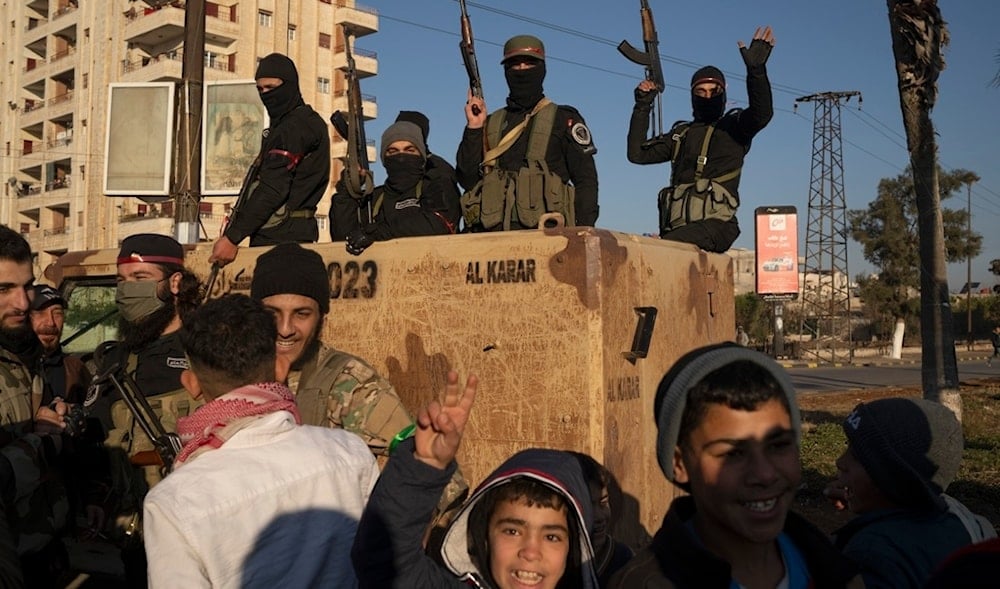Syrian gov. accused of imposing 'Islamist agenda' in school education
Outrage has erupted after the new Syrian government introduced changes to several school subjects, prompting accusations of promoting an "Islamist agenda."
-

Members of the security forces of the newly formed Syrian government stand on an armored vehicle in Homs, Syria, on January 2, 2025. (AP)
Syria's new government is facing backlash and accusations of imposing an Islamist agenda on school students after reviewing and establishing an updated educational curriculum.
Outrage erupted this week after the Syrian Ministry of Education released 12 documents detailing revisions and omissions in schoolbooks covering Arabic literature, history, sciences, social studies, and religion.
Most of the changes involved erasing references to the regimes of ousted president Bashar al-Assad and his father, Hafez, which included removing photos and mentions of the army and national anthem.
However, authorities sparked further concern by eliminating references to pre-Islamic deities—along with the term "deities" itself—and reducing criticism of the Ottoman Empire. Other omissions included the text of Syria's citizenship law, a section on the evolution of vertebrate brains, and mentions of Zenobia, the renowned pre-Islamic queen of ancient Palmyra.
Critics fear that Hay'at Tahrir al-Sham (HTS) is attempting to impose its religious views on what has long been considered one of the most secular countries in the Middle East. "The erasure of the defunct regime’s glorification is understandable, but deleting historical facts and events from our people’s struggle, and milestones of ancient civilizations. . . [is] not a coincidence," wrote Rima Flihan, a Syrian writer and human rights activist.
Bassam al-Kuwatli, president of the anti-Assad Syrian Liberal Party (Ahrar), criticized the caretaker government for implementing significant ideological changes without urgency. While he agreed that removing Assad’s legacy is uncontroversial, he emphasized that reforms should be handled by expert committees.
What did the current government change?
Amid widespread backlash, Education Minister Nazir al-Qadri clarified that the current curriculum would remain until committees are formed to review the schoolbooks. In the meantime, he ordered the removal of content glorifying the Assad regime and replaced the old Syrian flag with the opposition flag.
He further stated that authorities would also modify “some of the incorrect information . . . in the Islamic education curriculum”, including the interpretation of Quranic verses.
Moreover, religious studies, a compulsory subject in Syrian schools, includes separate books for Muslims and Christians. One change, made in a first-grade Islamic Studies textbook, involved an interpretation of a Quranic verse referring to "those who have earned [Allah’s] anger" and "gone astray" as referring to "Christians and Jews."
In the first-grade science book, the term "nature’s bounty" was replaced with "Allah’s bounty." Additionally, in a 12th-grade history book, a sentence about the notorious 1916 mass execution of Arab nationalists by the Ottomans—commemorated as a public holiday in Syria and Lebanon—was removed.
Both conservative and non-conservative Syrians criticized the recent amendments, with many expressing their anger on the Ministry of Education's Facebook post. Comments included complaints about the incitement of Jews and Christians and objections to the removal of Syria’s history.
Bassam al-Kuwatli warned that such unilateral changes could deepen societal divisions, stressing that this was the last thing Syria needed at a time when unity and disarmament were crucial.
Syrians remain concerned about extremist factions within HTS
Reuters reported that Christian leaders in Syria are urging their communities to minimize Christmas celebrations this year, despite reassurances from the new regime leadership that religious freedom will be respected.
Ahmad al-Sharaa, the de facto leader of HTS and the new Syrian regime, has attempted to project a more moderate image, swapping militant rhetoric for diplomacy.
He told Western officials and minority groups that his government would refrain from targeting Alawites, Christians, and other minorities. Yet, many Christians remain unconvinced of these promises of security and coexistence. Moreover, skepticism persists among Syrians regarding the new leadership’s ability to contain the group’s radical elements.
Al-Masri, a Damascus resident who provided only his last name, acknowledged that the new authorities have largely maintained order in Damascus and elsewhere. However, he voiced concerns that this stability might be short-lived.
“We know that Hay'at Tahir al-Sham is trying to change, and we welcome that," he told VOA.
"But there are two things that people in my circle are really concerned about. One is how genuine al-Sharaa is, and the other is how much control he really has over the more radical people in his group," al-Masri indicated.

 4 Min Read
4 Min Read








